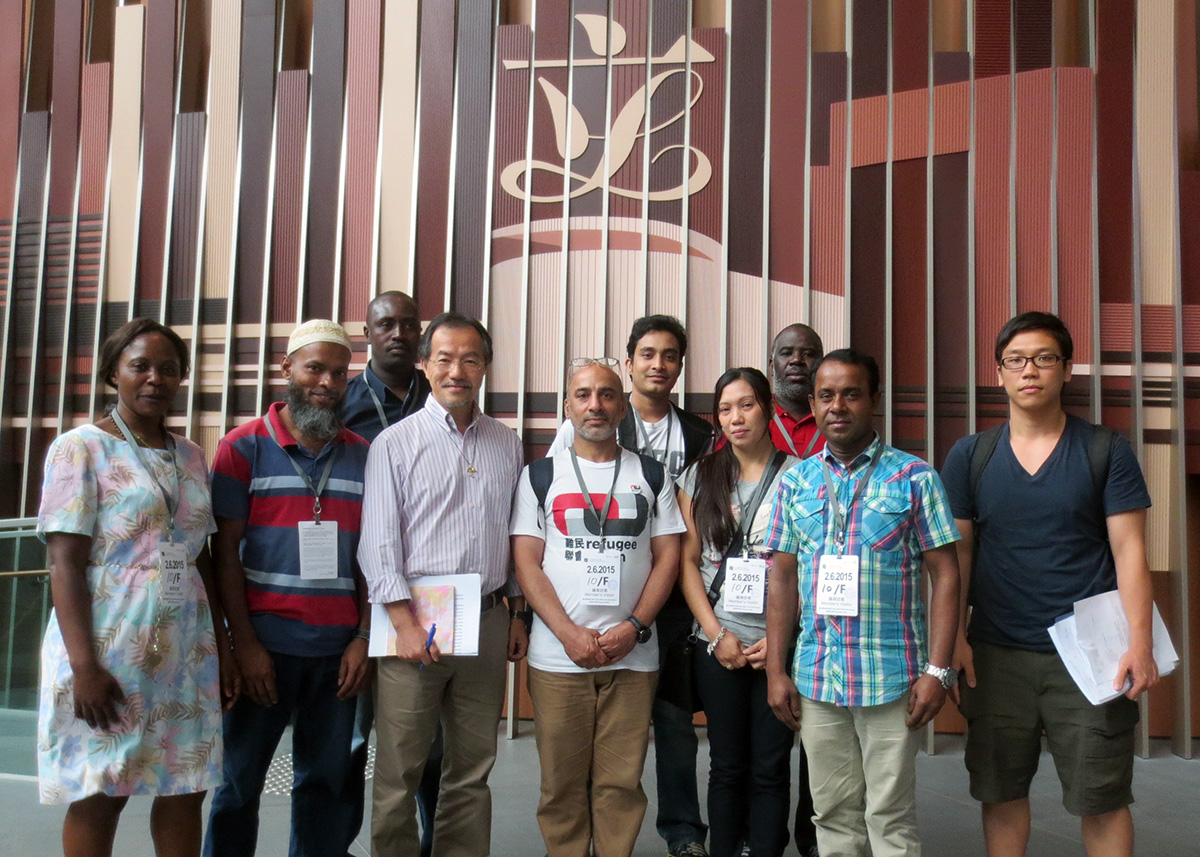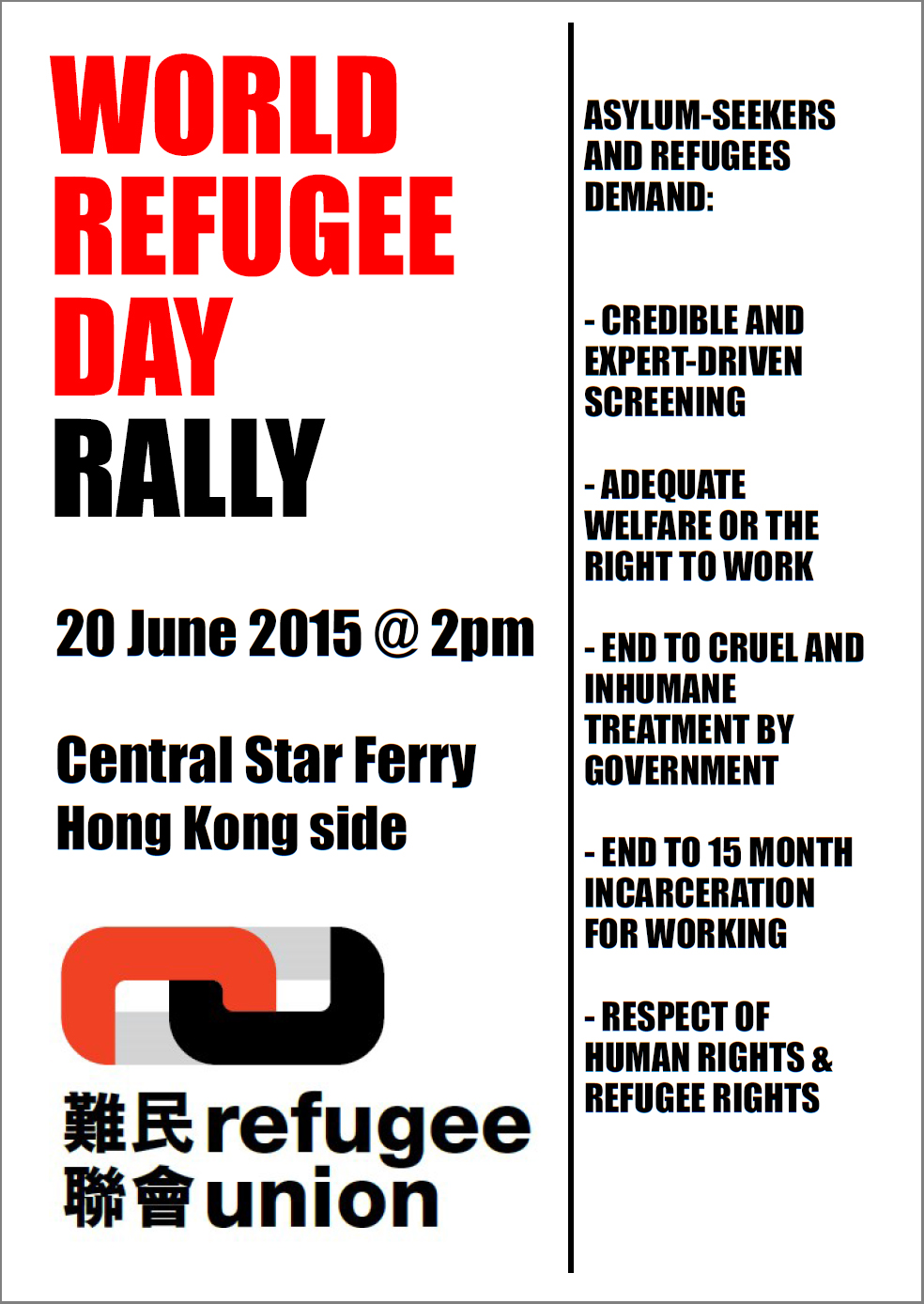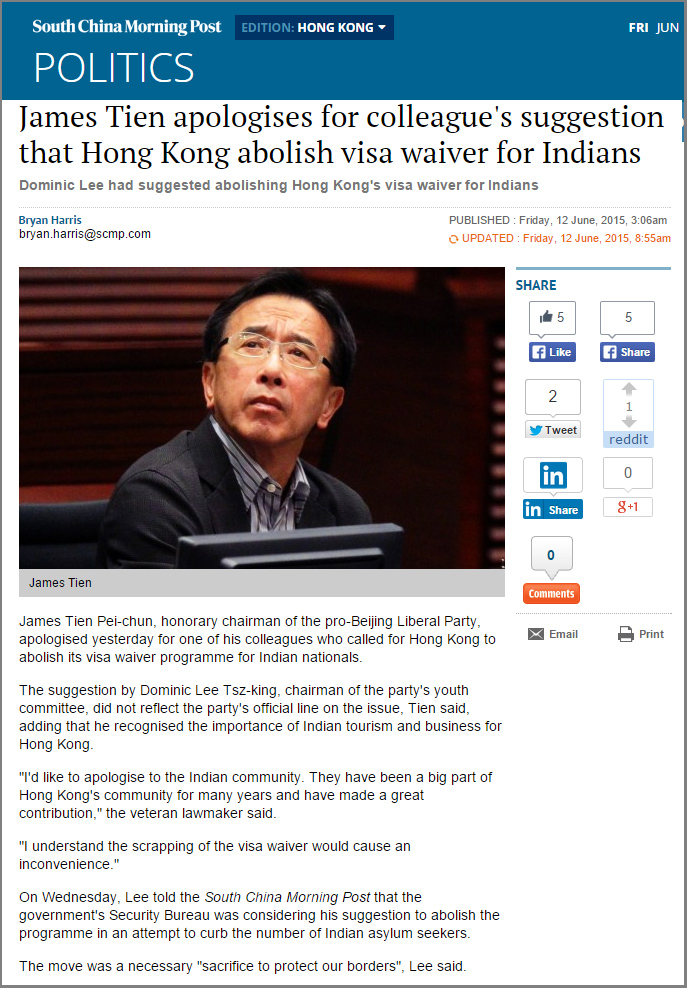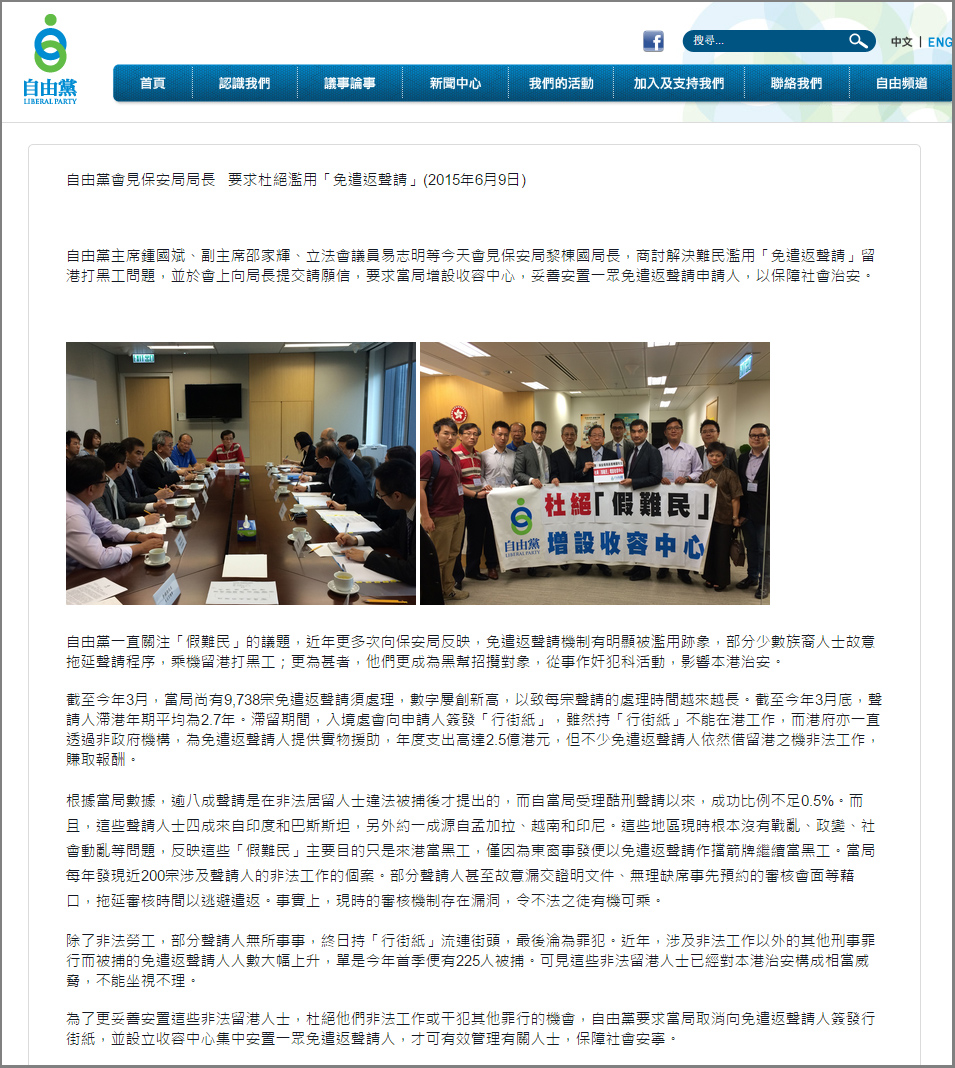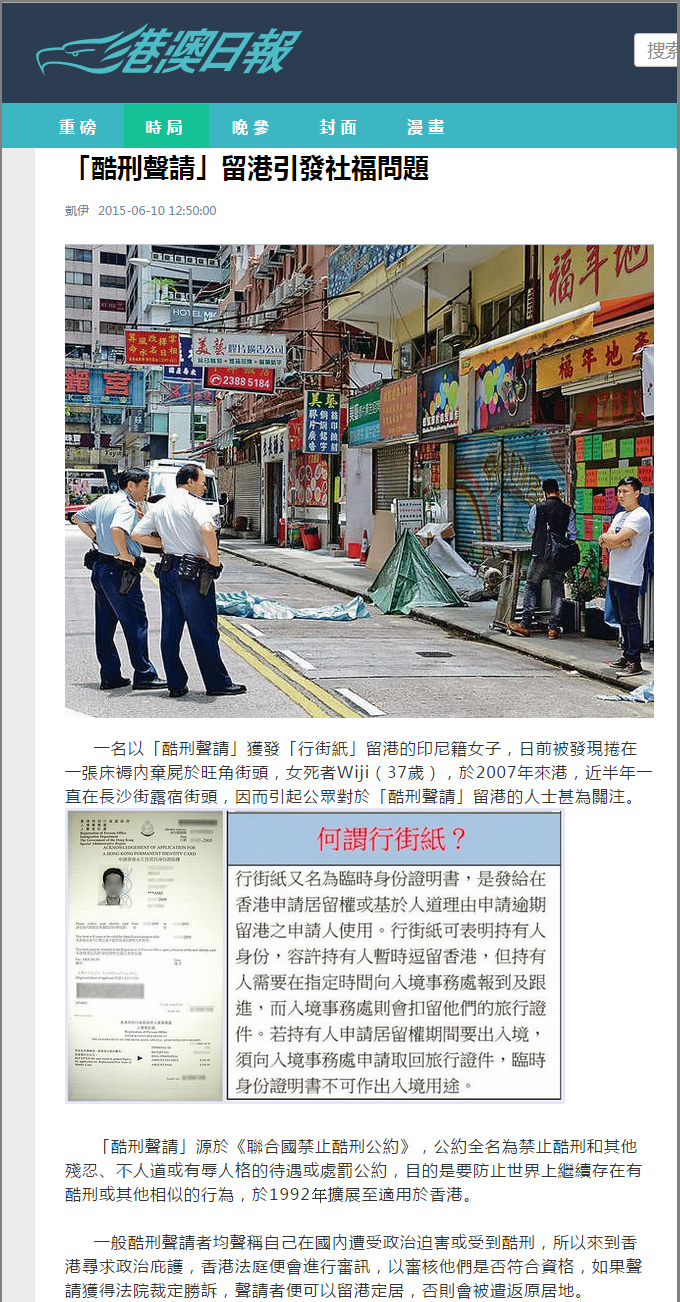Fundamental human rights affected and violated by government mass surveillance
Jun 16th, 2015 | VF Team | Comment
On 8 June 2015, Barrister Robert Tibbo joined the Hong Kong University Conference (8 – 9 June 2015) on “Privacy & Innovation – In Pursuit of Right Incentives” organised by Associate Professor Marcelo Thompson of the University of Hong Kong Law & Technology Centre. On the panel for that day, along with Mr. Tibbo were legislator Charles Mok, as well as Anne Cheng (HKU), Frederick Borgesius (Amsterdam) and K.P. Chow (HKU).
Mr. Tibbo spoke on government mass surveillance focusing on the conduct of the Five-eyes group of nations’ illegal mass surveillance spying operations. He further discussed the role of the United States NSA, Canadian CSIS / CSEC and New Zealand GCSB illegal spying activities both domestically and internationally. He discussed how in democratic societies today, legislators and politicians have brought into effect legislation and instituted policies and practices that are creating authoritarian systems of governance.
Mr. Tibbo cited Canada as a prime example of this disturbing development in government, highlighting Canadian Prime Minister Stephen Harper’s Bill C-51, which is far more intrusive into civil liberties than the now expired US Patriot Act. He also cited other disturbing developments in the Canadian government, including “Carding” by the police, whereby police officer can stop anyone on the street and question them without cause and record that conversation, later depositing it into an electronic database.
Mr. Tibbo highlighted that the current oversight regimes (Legislation) in various jurisdictions are vague, ambiguous and thus rife with abuse and potential abuse by the authorities. He pointed out that current definitions of strategic covert surveillance seek to contain cogent evidence, as a means to deprive an accused, or a surveillance monitoring court, of all relevant evidence. Such practices are ripe for abuse as demonstrated in Canada, USA and other states where governments are increasingly using public immunity defence to carry out illegal spying activities on civilians.
The necessity for Whistleblower mechanisms to be put into place and its role in protecting society from human rights abuses was raised by Mr. Tibbo. He explained that without such systems there can never be any real oversight over government mass surveillance activities.
Such violation and the gradual but steady erosion of fundamental rights and freedoms of people due to government spying on their own electorate was explained by Mr. Tibbo. He further opined that this has a chilling effect on people, who were increasingly modifying their normal behaviour out of fear of the government and thus were restricting the exercise of their own human rights which includes:-
Freedom of Expression
Freedom of Thought, Belief and Conscience
Freedom of Association
Freedom of Assembly
Freedom of Movement / Mobility
Freedom of Religion
In effect, governments have been able to restrict or violate citizens’ rights through wider mass surveillance programs and draconian criminal laws. Mr. Tibbo mentioned that he has asylum seeking clients who have been subjected to government mass surveillance and consequential abuses in their home countries, and had sought refugee status in Hong Kong.
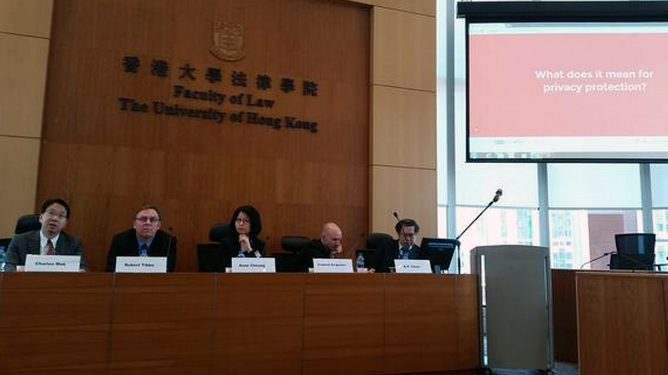
Immigration steps down removal process of refugee
Jun 15th, 2015 | Advocacy, Immigration, Legal, Rejection | Comment
An extraordinary effort by the Vision First pro bono legal team secured a significant success against the immigration machinery that processes, rejects and finally removes 99.9% of refugees who have the misfortune of seeking the protection of the Hong Kong Government.
The operation to secure the liberty of Mr. A (who cannot be named for legal reasons), a South Asian refugee who arrived in Hong Kong in 2014, commenced on 6 May 2015 when Barrister Mark Sutherland and solicitor Tam Kam Tong met him at a legal visit at the Castle Peak Bay Immigration Centre (CIC). On the same day, a request was made to the Immigration Removal Assessment Section (RAS) for his immediate release on the grounds that his detention was arbitrary and unlawful.
It transpired that Mr. A had been detained throughout the entirety of the process of assessment of his first tier non-refoulement claim a process which took more than four months. Vision First has previously commented on the Director of Immigration’s apparent disregard for the judgment in Ghulam Rbani v Secretary for Justice for and on behalf of the Director of Immigration [2014] 17 HKCFAR 138, which requires the Director to act expeditiously in releasing a refugee once a claim has been filed. Vision First is not persuaded that four months in Mr. A’s case can be said to be an expeditious move towards release on any reading. See our blog: Legal visit exposes apparent abuse in immigration detention centre.
The later refusal of Mr. A’s claim was inevitable in view of the Government’s rejection of virtually all first tier claims.
To pour salt on the wounds, the Appeal mechanism worked against Mr. A before it even got off the ground. His first tier lawyer provided by The Duty Lawyer Service told him “I will not help you on your appeal.” Mr. A was therefore left stranded to fight his own appeal. Vision First poses the rhetorical question: “How can this meet the high standards of fairness prescribed by the Court of Final Appeal circa ten years ago in Secretary for Security v Sakthevel Prabakar [2005] 1 HLKRD 289?”
Although the facts that compelled Mr. A to claim asylum are not yet known in detail, and might or might not be meritorious, that a lawyer was not assigned to his appeal prejudiced the high standards of fairness required for the determination of his claims. Barrister Sutherland observed, “It is an issue of real justice. The first instance lawyer refused to assist and a second opinion on merits was not apparently provided. It was not a level playing field. The refugee was ambushed by the appeal process without any chance of success. This case might expose a troubling lacuna in the Unified Screening Mechanism.”
The complex process that led to Mr. A’s release tried the skills and determination of his lawyers. The Director of Immigration, Mr. K.K. Chan did not consider the grounds put forward for his release and instead scheduled his removal on a flight out of Hong Kong on 11 June 2015. The morning before, Mr. A. called Arif of the Refugee Union pleading for an urgent intervention. Time was of the essence, because he was scheduled to be taken to the airport the following day.
In the morning of 11 June 2015, the legal team comprising Barrister Sutherland and solicitor Tam, acting on a pro bono basis, made an urgent application for a writ of habeas corpus ad subjiciendum, coupled with an application for stay of execution of the removal order.
An ex parte hearing on notice was set for that afternoon at which Mr. Sutherland submitted to the Hon. Judge Chow that Mr. A could not be removed because he had not exhausted his legal remedies. These included an application for leave for a judicial review of his asylum claim rejection, as well as a damages claim for unlawful detention, not to mention an appeal against the refusal of legal aid.
The application was won by the Director of Immigration, who was represented at the hearing, despite the first-tier Notice of Decision and the Appeal Decision not having been made available in Court. This was against the backdrop of requests made to the Director of Immigration and The Duty Lawyer Service to produce all the documents pertaining to this case, all of which remain unanswered.
A message from a Refugee Union member later circulated on social media, “This calls for the Union to have heart. I saw our lawyer and barrister sweating on behalf of the refugee and I felt like collapsing due to the Immigration lawyer was insisting on removal. I saw people who don’t have empathy at all. Anyway we need to push forward.” Her disappointment was certainly shared by her colleagues.
After the hearing, the Immigration officers and Department of Justice Counsel Mr. Lawrance Chan were clearly pleased with the result, as evidenced by their smiling faces.
After the Court hearing, Solicitor Tam and Arif rushed to the airport to seek urgent instructions, but Mr. A was nowhere to be found. Both Immigration and the Police could not shed any light on his whereabouts.
Early the following day Barrister Sutherland recalls, “I personally telephoned CIC to ascertain Mr. A’s whereabouts and to notify Immigration Officer Mr. S.K. Wong that an urgent legal visit had been requested for later that day. To this, Mr. Wong, whilst confirming that Mr. A was at CIC, sounded surprised and replied, ‘You had better be quick because we are taking him to the airport tonight’”.
In the afternoon of 12 June 2015, the legal team met a visibly shaken Mr. A in CIC. He was afraid of being deported. It is likely that CIC officers had informed him about the High Court failure, at which he was not present despite the requirement for authorities to “produce the body” in habeas corpus proceedings, which is Latin for “you [shall] have the body”. It became apparent that the next few hours would be crucial as the Director of Immigration, Mr. K.K. Chan decides to either remove or release the refugee.
Mr. A’s “Right to Life” claim under Article 2 of the Bill of Rights had since been filed and the Director of Immigration warned not to remove him due to this further legal impediment.
At 6pm a triumphant Barrister Sutherland reported, “There is a new term in the asylum vocabulary. The Director of Immigration decided to STEP DOWN the removal procedures. Mr. A’s “Right to Life” application was accepted and tonight he will be moved to Ma Tau Kok (Immigration office). I expect he will be released very soon. The removal was successfully stopped at the eleventh hour.”
Later that evening Arif of the Refugee Union received an unexpected phone call from Ma Tau Kok. Arif reported, “Mr. A just called me from Ma Tau Kok. He could not contain his happiness. What a difference a day can make! This morning he was desperate because he was sure he would be deported. Tonight he couldn’t be happier because he is still in Hong Kong. He is so thankful for those who fight so hard for him.”
Vision First is pleased to report that Mr. A was released from detention on Saturday, 13 June 2015. It is now our tum to smile.
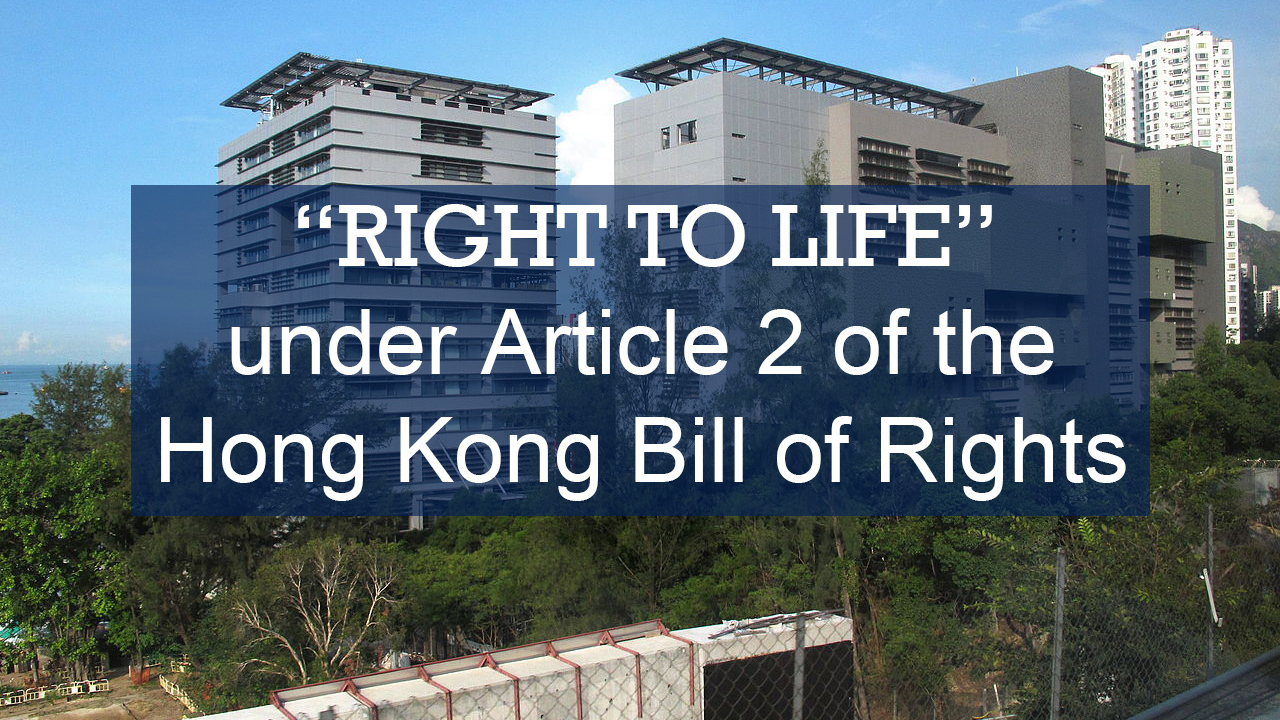
Liberal Party apologises for suggestion to abolish visa waiver for Indians
Jun 12th, 2015 | Immigration, Media | Comment
Hong Kong is a paradise for bad people and hell for good people
Jun 12th, 2015 | Crime, Immigration, Personal Experiences, Rejection | Comment
Vision First publishes letters and documents that our members wish to circulate to the wider public. In the best public interest, the following letter offers significant insights into the health of the current asylum mechanism and correlated issues. Hong Kong is a city of economic riches where business and profit are the prime engine upon which the government relies to retain the city’s international competitiveness. Are asylum policies integral elements supporting and/or removing impediments to economic growth?
Hong Kong is a paradise for bad people and hell for good people
I was a high profile political leader in a South Asian country. After 9/11 the USA and Western states decided to punish the militants involved with the terrorist attack on the World Trade Centre in New York. Our political party decided to stand with the so-called civilized world in the war against terrorism to defeat militancy. By doing so, party workers and leaders suffered great retaliation from several militant groups. As a result, over 1000 party members and relatives were killed by militants in kidnappings, suicide bombings and target killings. Further, some 10,000 party members and supporters fled abroad to save their lives from extreme brutality.
As per party policy, I also condemned the terror tactics of the militant groups in the local media and public meetings. By doing so, the militants turned their guns on me and my family, preventing me from attending my business and moving freely in my country. I received dozens of death threats by phone. I was beaten. My son was kidnapped and attempts were made to kidnap me too. The militants shot at me, my car and my home. Consequently, I lost my prosperous business and it became impossible for me to remain in my country.
Previously I had visited a number of European countries for business, but unfortunately when I decide to flee, I only had a Hong Kong visa, so I decided to take refuge here from the brutality of the militants. That was six years ago when I naively had the expectation that the Hong Kong Government and citizens would appreciate my sacrifice in the War Against Terror and help me stand back on my feet again.
But sorry to say that my expectations were ruined. After spending six years in Hong Kong, I am still in the same place where I started my journey. I have been maligned, humiliated, disrespected and forced to live like a beggar without future prospects. I provided all the necessary information and documents to the Immigration Department and requested them to please help me, but due to the Culture of Rejection my claim remains pending.
I also provided the same evidence to the UNHCR for my asylum claim, but they rejected it. It was only after five years suffering in Hong Kong that they turned around on their appeal rejection and unexpectedly granted me refugee status. Now I do not know how long I will further stay here before being re-settlement to a third country. One thing is notorious about Hong Kong: there is no appreciation or respect for the asylum seekers and refugees living here!
I have noticed that people come from all over the world and can live in Hong Kong for many years after obtaining a Recognizance certificate from the Immigration Department. I believe that getting such a document is very easy. After obtaining it, people can contact the ISS office to eat and live freely for many years.
As a politician and educated person I have noticed that the screening systems of Hong Kong Immigration is not fair, or just a joke. They do not make a difference between a HORSE and a DONKY and treat both the same way. This is the main reason that very large majority of torture claimants are fake and just come here to improve their financial conditions. I met many asylum seekers and torture claimants who are in Hong Kong for many years, they obtain fake ID and work with local businesses making good money.
I am sure this is the main reason for economic migrants to come to Hong Kong, when they know that they can stay free of cost for ten years and earn 15 to 20 thousand HKD per month. So surely one can say that “Hong Kong is a paradise for bad people and hell for good people”.
Through the publication of this letter I request to genuine asylum seekers not to come to Hong Kong to receive justice because there is no justice here. Yes, if you want to work and make money, then Hong Kong is the best place in the world, where you will obtain fake ID and make a fortune working for years.
Sincerely,
Mr. Khan Zeb
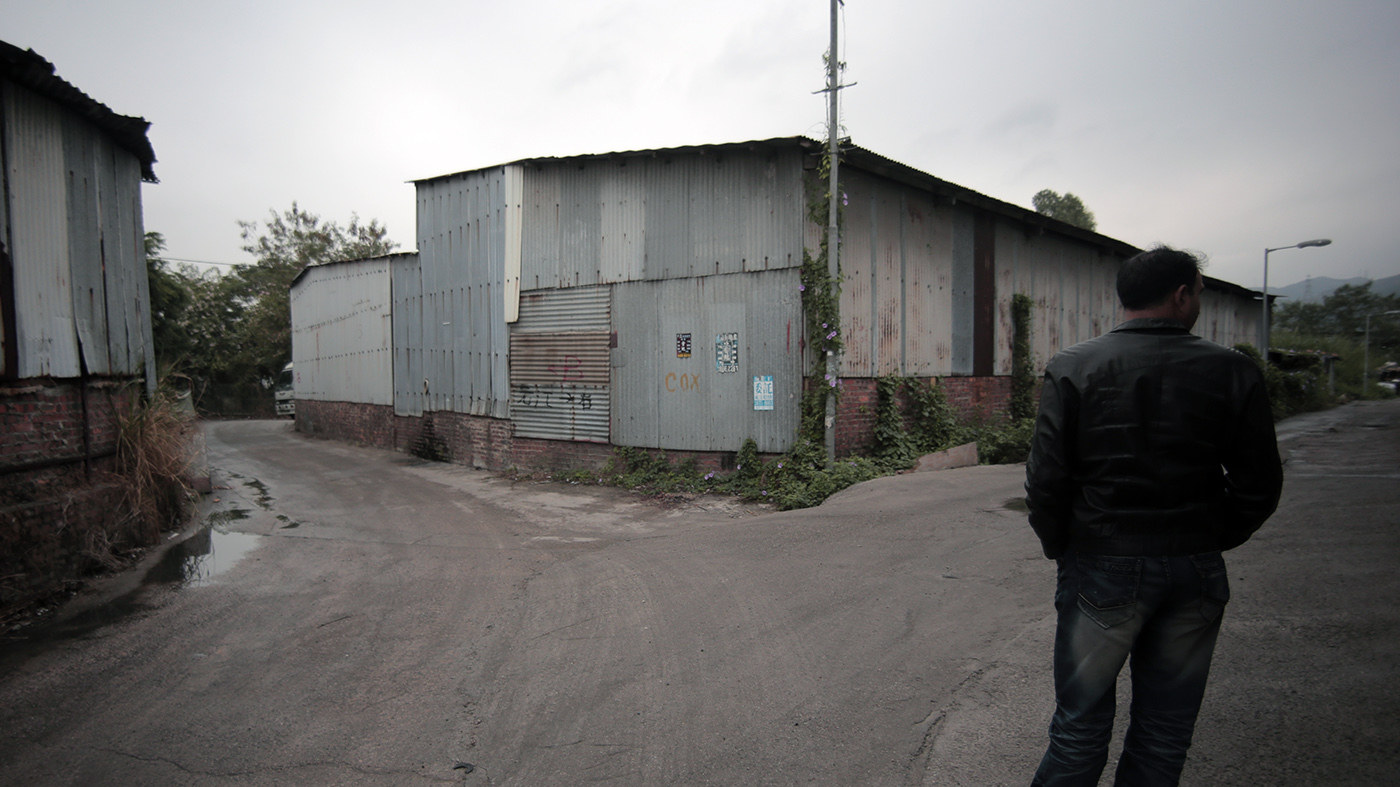
Liberal Party call for “sacrifice to protect our border”
Jun 12th, 2015 | Immigration, Media | Comment
Homeless asylum seeker found dead in Hong Kong streets
Jun 11th, 2015 | Crime, Housing, VF Opinion, Welfare | Comment
An Indonesian refugee was found dead wrapped in a discarded mattress on the streets of Mongkok on 9 June 2015, reported the South China Morning Post on 8 June 2015. This tragedy highlights a general lack of protection for refugees in Hong Kong.
Homelessness is increasingly a problem faced by many asylum seekers who are not only denied sufficient welfare assistance, but are also increasingly made to wait long periods before they can access such assistance. The case of a refugee minor who was homeless for two months was reported by Vision First last week.
In April a fire broke out on a foot bridge in Sham Shui Po where many street-sleepers lived. It is reported that several dozen homeless refugees live in cardboard boxes in the area, exposed to the elements as well as to risks of fire, disease and crime. There is a troubling correlation between severe destitution and criminality – both as perpetrators and victims.
The government claims that refugees, officially branded ‘illegal immigrants’, are a problem for the security of society and therefore must be removed as soon as possible. A question should be raised: are refugees the only ones allegedly posing a threat to society? Isn’t the government endangering the life of people whose prolonged stay in Hong Kong is the responsibility of flawed border controls and a judicially bashed asylum mechanisms?
A Coroner’s Examination ought to be launched into the most recent death to ascertain why and to what effect a refugee woman, who is said to have lodged a claim in 2007, and therefore was in Hong Kong for over eight years, was apparently homeless in Mongkok.
A troubling reality might be presented before our eyes. Does the current assistance fail to offer in-kind assistance “to prevent them [refugees] from becoming destitute”?
Vision First is concerned about the generalizations made by Deputy Director of Social Welfare, Mr. Lam Ka-tai, at a Legco Panel on Welfare Services meeting, following the Hon. Elizabeth Quat’ question, “Are there any (refugee) street-sleepers?”
The Hon. Quat persisted, “Do you know if any of them are street-sleepers? Do you know?” Mr. Lam’s ensuing response came as a surprise, “As far as I know there aren’t any!”
Mr. Lam Ka-tai may perhaps want to examine the 76 article on our website relating to homeless refugees, and discover a reality he might have been concealed from him. This link is provide for his convenience: https://www.vfnow.org/?s=homeless
UPDATE:
http://www.ejinsight.com/20150609-pakistani-wanted-in-the-death-of-indonesian-woman/
http://www.thestandard.com.hk/news_detail.asp?pp_cat=11&art_id=157883&sid=44641693&con_type=1&d_str=20150611&isSearch=1&sear_year=2015
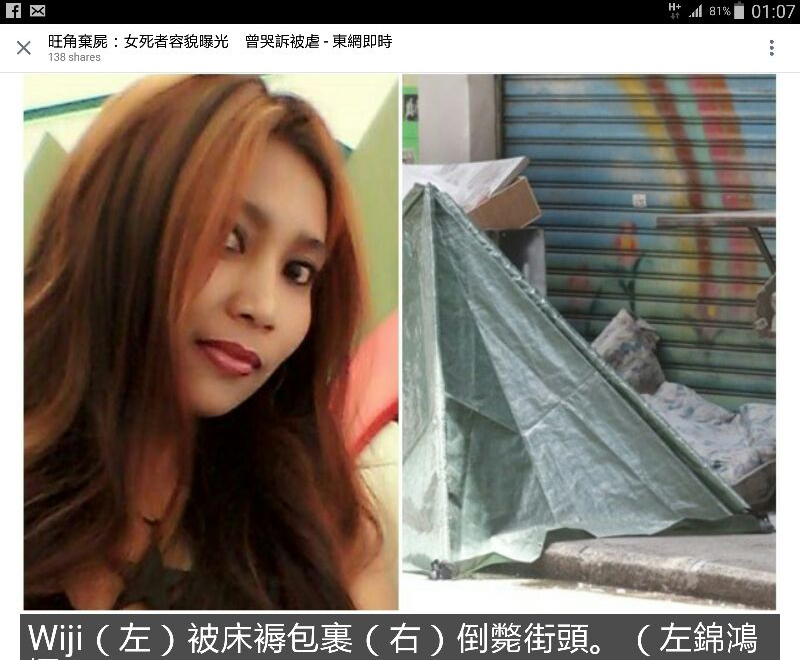
ISS-HK Notice to Service Users
Jun 10th, 2015 | Food, Housing, Welfare | Comment
Vision First welcomes the accommodation term in the below notice informing:
“Locating a suitable accommodation within the assistance level is the joint responsibility of the claimants and ISSHK and ISSHK would in general assist at most three times in the identification of available housing for each claimant unless for very special cases.” (emphasis added)
This positive development ought to require case workers to accompany refugees flat/room hunting, assisting them in securing suitable accommodation. Whether it can be achieved within the rent allowance of $1500 remains to be seen, though the experience will undoubtedly educate case workers about the difficulty of such an endeavor.
Should they face difficulties with the rent allowance, refugees are invited to lodge complaints directly with the SWD Head-office (8/F, Wu Chung House, 213 Queen’s Road East, Wanchai), as assurances have been made that rent levels may be adjusted on a case-by-case basis. In this respect, Vision First confirms that many refugees have successfully increased rent allowances by pleading their case with the SWD Head-office.
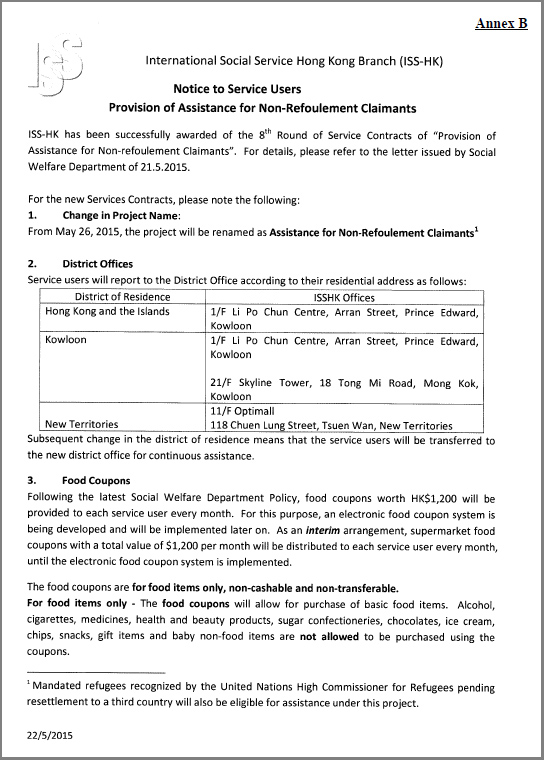
Lawmakers take government to task on inadequacy of refugee welfare
Jun 10th, 2015 | Food, Government, Housing, Welfare | Comment
A stark difference in terminology was evident at the Legislative Council meeting of the Panel on Welfare Services on 8 June 2015. On the one hand, the Security Bureau blatantly branded asylum seekers and refugees “collectively as ‘illegal immigrants’”. On the other, the welfare panel titled the session as “Issues relating to welfare of refugees, torture claimants and asylum seekers” and lawmakers used the terms refugee or claimants during the hour-long discussion,
Vision First deplores the Security Bureau’s brief that repeatedly vilifies refugees as: “foreigners who smuggled themselves into Hong Kong”, “to safeguard immigration control and for public interest, they should be removed as soon as practicable”, “the illegal immigrant status of non-refoulement claimants will not change,” and “illegal immigrants seeking non-refoulement in Hong Kong are not to be treated as ‘asylum seekers’ or ‘refugees.’”
Such rhetoric ought to be tempered by an awareness of the inalienable nature of the fundamental right to seek asylum – including in Hong Kong. In his opening remarks, Dr. Hon. Fernando Cheung Chiu-hung lamented, “Although we have not signed the UN Refugee Convention, refugees do exist … More advanced societies feel the responsibility of taking care of these refugees on humanitarian grounds. So first of all, I have to say that we should not label these people who flee their country to Hong Kong as illegal immigrants. Many of them entered our Territory through legitimate means.”
Turning to welfare issues, Dr. Fernando remarked, “Food coupons are an improvement. In the past many media organizations conducted investigations and in fact one third of funds were lost through the distribution of food at the seven food distribution outlets (appointed by ISS-HK). So food coupons are an improvement … But some refugees are prevented from purchasing (certain items). Why are they prevented? Who set the rules? … Who made the list (of allowed items)?”
The SWD responded that an electronic coupon scheme would be rolled out for purchases from other supermarkets, as well as ethnic shops selling specialty items such as Hallal food. It was further agreed that a list of banned products would be supplied so that refugees and shop attendants are informed about what is permitted and what is banned. Vision First laments that refugees were not consulted beforehand and we will lead negotiations with the SWD to optimize the food list.
The Hon. Poon Siu-ping inquired about the USM claim process, average and maximum length of asylum and locations where refugees customarily work. In this respect he inquired, “(Regarding refugees working illegally) I would like to know if this is due to insufficient welfare assistance. Has the SWD been giving extra help with their living expenses?”
Mr. Billy Woo, Principle Assistant Secretary of the Security Bureau, provided general information about 10,000 pending USM claims; Immigration will process 2000 cases in 2015; many cases of employment take place in remote recycling and auto parts yards; claimants remain in HK on average 2 to 3 years, some as long as 8 to 10 years; many overstay over 12 months before lodging a claim. The question about insufficient welfare was skillfully evaded.
The Hon. Albert Ho Chun-yan robustly criticizes current policies, “I am shocked to know that some refugees have been stuck here for almost 10 years. Even 4 years is very long! (As some are effectively stateless) we have the duty to accept them because they have been here for more than 10 years. Do they have to wait for another 10 or 15 years? … And the humanitarian assistance program is not really humanitarian enough … What can they afford with $1500 a month for accommodation? The greatest problem is they are not allowed to work … It is just like putting them in jail. Can you relax the restriction on employment?”
The Security Bureau gave a historical retrospect on court judgments emphasis that claims must be assessed according to high standards of fairness. Attentive readers might wonder whether such requirements correlate with screening results, that is, 28 successful claims out of a total of 10,000 determination in 23 years since the UN Torture Convention was extended to Hong Kong in 1992.
Mr. Woo then remarked, “If their claim is substantiated they may apply to the Director of Immigration for employment …” He was abruptly interrupted by Hon. Ho, “Yes, when their claim is substantiated, but some have been waiting for 10 years! Why can’t you allow them to take up employment with some conditions? Mr. Woo reiterated that due to immigration control and public interests, the current policy would not be changed.
Dr. Hon. Helena Wong Pik-wan put forward several requests, “Can you make a performance pledge that claims will be settled within two years of arrival? The significant criterion is how much time does have claimant have to wait … If you don’t have enough personal, you should recruit more people … This is very inhuman because (refugees) are just kept from becoming destitute, but you do not allow them to work. What can they rent for accommodation with $1500 a month? Can you tell us where the claimants live with $1500 a month? They are not allowed to work, so do they come to Hong Kong with a lot of assets? If they have no idea how long they are going to wait, shouldn’t you designate places of employment so that they can supplement their means of subsistence?”
The Security Bureau responded obliquely about the court rulings it must follow, before inviting Mr. Lam Ka-tai, Deputy Director of Social Welfare, to respond. Mr. Lam remarked, “Most of the claimants live in Kowloon and the New Territories. I have visited some who live in old building in Mongkok. Maybe 2 share a room … We encourage them to share rooms because this is not a welfare provision, but humanitarian assistance.”
Neither the Security Bureau, nor the SWD addressed the issues of insufficient rent assistance and designated work places for refugees to work legally. The Hon. Leung Che-cheung observed, “… $1200 for food does not seem to be adequate. Perhaps this is why they resort to working illegally.” Mr. Lam of the SWD responded, “… During their stay in Hong Kong, if they are unable to meet their living expenses, then on humanitarian grounds we will provide humanitarian assistance, but I emphasis this is on humanitarian grounds, it is not welfare benefits …”
The Hon. Leung Kwok-hung ‘Longhair’ enumerated current levels of assistance and remarked, “Although you say that by discretion you can approve a higher amount, basically it is not sufficient so there are only two ways to address the problem. One is to withdraw from the mechanism altogether (i.e. the UN Torture Convention) and stop claimants from coming … (the other) is to allow them to work under your supervision is better than allowing them to work anywhere. In fact (to imprison refugees for working) is more expensive than the welfare costs.” The Security Bureau reiterated it was bound by court rulings and planned to fast-track screening, but sidestepped the issue.
Dr. Hon. Kwok Ka-ki supported a performance pledge for screening before asked, “How is the $1200 amount for food set? Because $1200 a month for food really isn’t sufficient. According to media reports, ISS-HK has been receiving very bad reviews from service users, and yet the three regions of the contracts were awarded to ISS. What is the reason? Is it because you didn’t receive bids from other tenderers? Why is it that despite their poor review and feedback, you still allow the ISS to pick up the contracts?”
The SWD listed numerous food items available and remarked, “On production of a medical certificate, the SWD will decide on the case merit … if the budget of 1200$ is not sufficient. As for ISS-HK … we invited NGOs to submit bids for the service contract and ISS-HK was the only eligible bidders.” He was interrupted by Dr. Kwok, “My question is, where there other bidders?” prompting a significant clarification from Mr. Lam, “Apart from ISS-HK, we did not receive other bids”.
Vision First observes that this statement raises a thorny question: ISS-HK being a Swiss multinational, why wasn’t a single local NGO interested in providing so-called humanitarian assistance to refugees? Could it be that the levels of assistance were considered unreasonable and thus impracticable and perhaps morally reprehensible?
The Hon. Elizabeth Quat returned a leading issue of the meeting, “In relation to the accommodation, I see there is a rental allowance of $1500 per month. We are short of housing in Hong Kong. With $1500, have you considered where (refugees) are living? Are there any street-sleepers?”
The SWD responded, “They mostly live in Kowloon and the New Territories. We encourage them to share a flat, because for four persons if they share a flat they can afford a $6000 flat with two bedrooms …” The Hon. Quat interrupted, “I would like to know if the administration has the addresses of the 9000 odd claimants in Hong Kong? … Is it mandatory for the claimant to report an address to ISS?” After beating around the bush, the Security Bureau confirmed, “ISS does have the addresses.”
The Hon. Elizabeth Quat pushed on, “Perhaps a paper can be produced after the meeting. I would like to know about their state of accommodation. Do you know if any of them are street-sleepers? Do you know?” The response by Mr. Lam of the SWD came as a surprise to Vision First, “As far as I know there aren’t any! … The ISS must make an individual assessment. The ISS has to visit the accommodation and look at the conditions. They have to a thorough assessment before giving the rent allowance.” Vision First has frequently blogged about homeless refugees and brought such matters to the attention of Mr. Lam’s staff.
In the second round of questions, Dr. Fernando remarked, “When the service contract was to be awarded, one of the terms in the tender was that no single organization can get all three (service regions). Yet the SWD has failed to follow this. This is regrettable, because we have seen many problems with ISS-HK in carrying out the contract.”
Dr. Fernando took the authorities to task, “With $1500 a month it is very difficult for anyone to rent decent accommodation. If they are willing to share a flat that is better, otherwise many refugees are paying well beyond the rent allowance. I want to ask why ISS cannot sign the tenancy agreements on behalf of the refugees. In fact many refugees have to pay more than $1500 rent. I don’t think this is possible because these people are not allowed to work, they don’t have any income.”
The lawmaker was relentless, “Where can (refugees) find the money to rent bed spaces that cost over $1500? Isn’t this policy forcing refugees to do something illegal? They cannot rent a unit costing more than $1500 without an income. I would like to known the number of cases where there is over-payment of rent and why ISS can’t sign the leases. And what is the mechanism for adjusting the rent and food allowances, is it done annually?”
The SWD sidestepped the issue by remarking that many claimants had sign contracts already before they registered with ISS-HK. This is another statement Vision First will disprove with data, particularly relating to new arrivals who seek immediately assistance and to refugees who have lived in Hong Kong for over a year, the typical duration of leases for subdivided rooms.
The Deputy Director of SWD, Mr. Lam concluded with an indirect reference to the 69 refugee slums exposed by Vision First between May 2013 and November 2014, many of which have not been closed down for lack of viable alternatives within the $1500 rent allowance. Mr. Lam remarked, “The important is for the SWD or ISS to assess whether the accommodation (refugees) have sought is appropriate or not.” Vision First will continue to monitor the legality of refugee housing.
